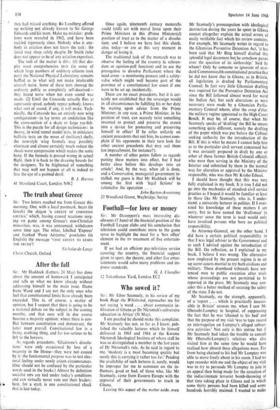After the fall
Sir: Mr Haddock (Letters, 24 May) has done about the amount of homework I anticipated and tells us what we know already without addressing himself to the main issue. Dame Irene Ward and I are not the only ones who feel that constitutional limits have already been exceeded. This is, of course, a matter of opinion, but I suspect that there is going to be a national debate on the subject in the coming months, and that ours will in due course become a majority opinion; where there is con- flict between constitution and democracy, the latter must prevail. Constitutional law is a living, evolving thing, and far too serious to be left to the lawyers.
As regards precedents, 'Gladstone's dissolu- tions' were only occasioned by loss of a majority in the House—they were not caused by it; the fundamental purpose was to test elec- toral feeling under newly arisen circumstances. (One should not be confused by the particular words used in the books.) Almost by definition socialist MPS are tied under today's conditions and can virtually never vote out their leaders; here, for a start, is one constitutional check that is lost today. Once again, nineteenth century monarchs could (still) act with moral force upon their Prime Ministers in this (Prime Ministerial) position of trust as to the matter of a dissolu- tion; and I believe we have lost this check, also, today—or are at this very moment in danger of losing it.
The traditional task of the monarch was to observe the feeling of the country (a referen- dum or opinion-poll function) and to use the prerogative to dissolve Parliament where the need arose—a monitoring process and a safety- valve which might well become part of the province of a constitutional law court if one were to be set up, incidentally.
There are no exact precedents, but it is cer- tainly not established that the sovereign would in all circumstances be fulfilling his or her duty by waiting upon advice from the Prime Minister; in any case, a Prime Minister, in his position of trust, can scarcely twist something invented to protect and preserve the crown into a device for protecting and preserving himself hi office! If he relies unfairly on ancient precedents that suit him, he cannot com- plain if his opponents in their turn look for other ancient precedents that may suit them (an impeachment, for instance?).
A number of other points follow as regards putting these matters into effect, but I had better close before this develops into an article! And, by the way, when all is done, and a Conservative, managerial government in- stalled, my guess is that Mr Haddock will be among the first with 'legal fictions' to rationalise the operation . . .










































 Previous page
Previous page